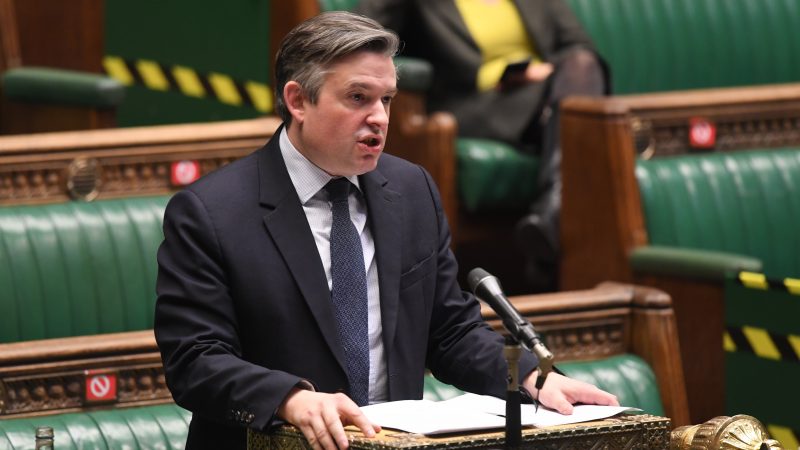
Jonathan Ashworth has challenged the government over its ‘red list’ of countries identified for Covid restrictions, highlighting that over half of the countries that have reported cases of the South African variant are not included.
Responding to a parliamentary statement from Matt Hancock this afternoon, the Shadow Health Secretary questioned the government minister over proposals he outlined today that bring in new health measures at the border.
“Our first line of defence is surely doing everything we can to stop them arising in the first place. That means securing our borders,” Ashworth said. Labour has criticised the government for having schools closed but borders open.
“Why then – when over half of countries where the South African variant has been identified, why are half of them not on the so-called red list? And, indeed according to newspaper reports, he wanted to go further with quarantine arrangements.
“I want that as well. The British public want that as well. So, I will work with him to make that happen so that we can strengthen our borders and fix any holes in this nation’s defences.”
The Health Secretary in response committed to keeping the red list “up to date”, but argued that it is “important that we’re proportionate when there are countries that do not have a record of variants of concern”.
Hancock told MPs that from Monday new travellers coming into the UK will now have to take two additional tests for the virus during their ten-day stay in isolation, on days two and eight after their arrival.
Critics have highlighted that the measure announced today represents only a minor adjustment. Travellers were already required to have a negative Covid test 72 hours before their journey and to quarantine on arrival.
The new testing requirement will apply to all of those coming to UK, not just those coming from ‘red list’ countries. If a person tests positive for Covid, their isolation period will be automatically extended by a further ten days.
Under the plans for those who have been in a red list country within the past ten days, arrivals will be escorted to a hotel where they will stay for their ten-day isolation. Each will be forced to pay £1,750 for the hotel, transport and testing.
“People will need to remain in their rooms and will of course not be allowed to mix with other guests,” the Health Secretary told MPs. “And there will be visible security in place to ensure compliance alongside necessary support.”
Hancock announced a number of new fines “backing this new system”, with a legal duty and a fine for noncompliance for passenger carriers to make sure that passengers have signed up for the new arrangements before they travel.
Those who fail to take the first test will be liable for a £1,000 fine. If they fail to take a second, they will face a £2,000 fine. For not quarantining in a designated hotel, they could see a £5,000 to £10,000 fixed penalty notice.
He also said that anyone who lies on the passenger locater form, or who tries to conceal that they have recently been in one of the countries on the red list drawn up by the government, could face a prison sentence of up to ten years.
The statement on the adjustment to the quarantining procedure from the Health Secretary followed pressure on the government over the past week to toughen up border controls, particularly in light of the South Africa variant of the virus.
Labour has accused the government of being “irresponsible”, and threatening the UK Covid recovery, by not introducing a comprehensive hotel quarantining system sooner to stop the spread of new mutations of the virus.
Keir Starmer accused the government of “leaving a back door open at a vital stage in the battle against the virus” on Monday. His party has been calling for a blanket hotel quarantine policy for all arrivals coming from any country.
There are 33 countries included on the red list at the moment. They are for the most part countries in South America and southern Africa. Below is the full list:
- Angola
- Argentina
- Bolivia
- Botswana
- Brazil
- Burundi
- Cape Verde
- Chile
- Colombia
- Democratic Republic of Congo
- Ecuador
- Eswatini
- French Guiana
- Guyana
- Lesotho
- Malawi
- Mauritius
- Mozambique
- Namibia
- Panama
- Paraguay
- Peru
- Portugal (including Madeira and the Azores)
- Rwanda
- Seychelles
- South Africa
- Suriname
- Tanzania
- Uruguay
- UAE
- Venezuela
- Zambia
- Zimbabwe




More from LabourList
Government announce SEND reform in schools white paper
SPONSORED: ‘Industrial hemp and the challenge of turning Labour’s priorities into practice’
‘A day is a long time in politics, so we need ‘action this day’’